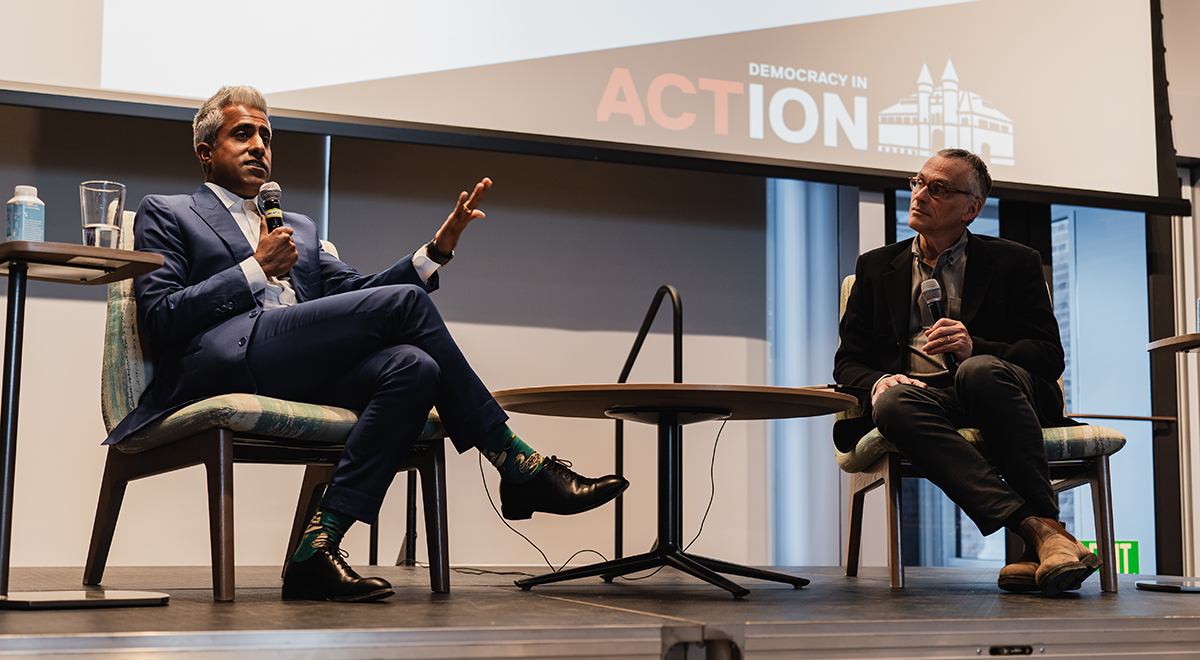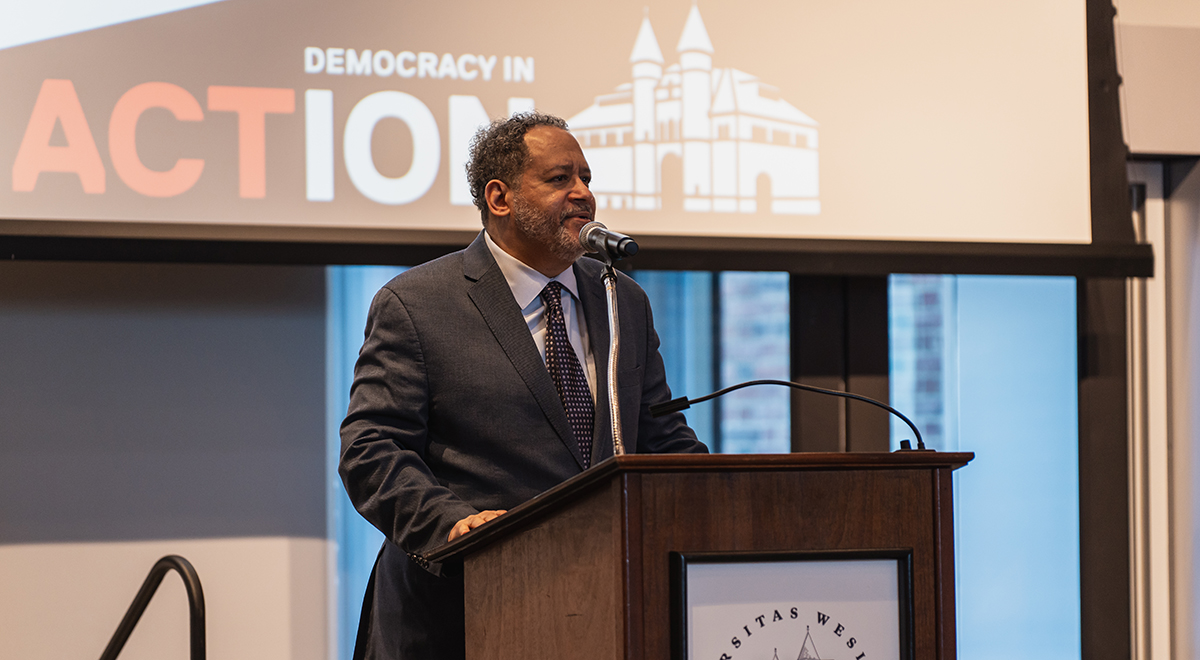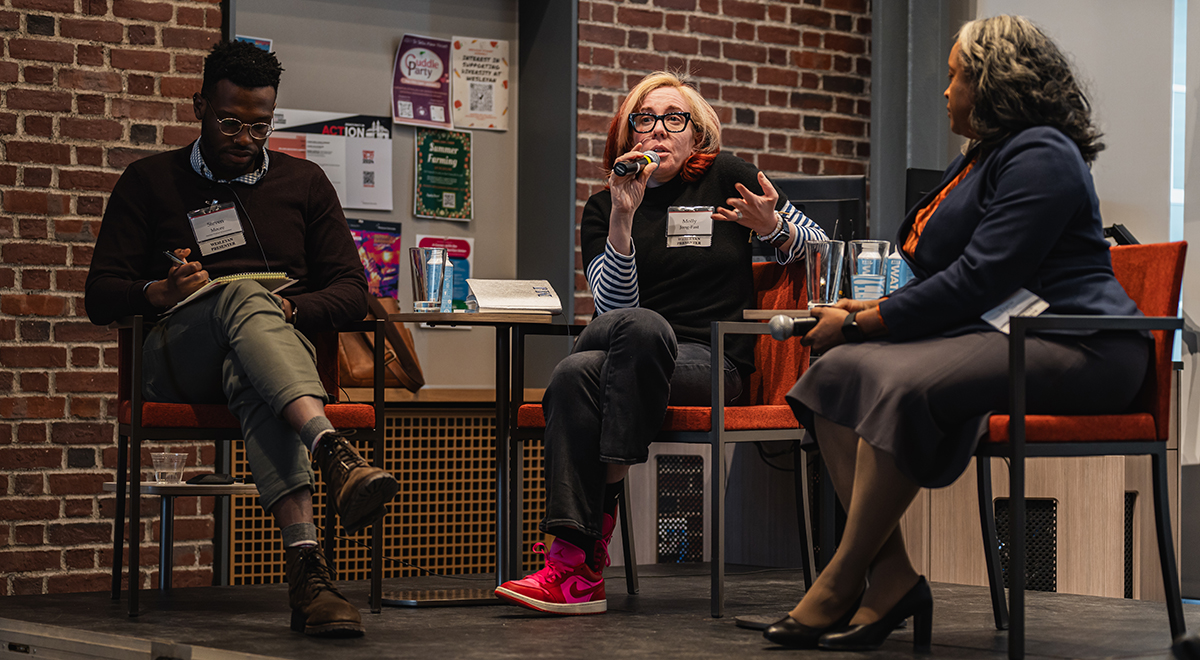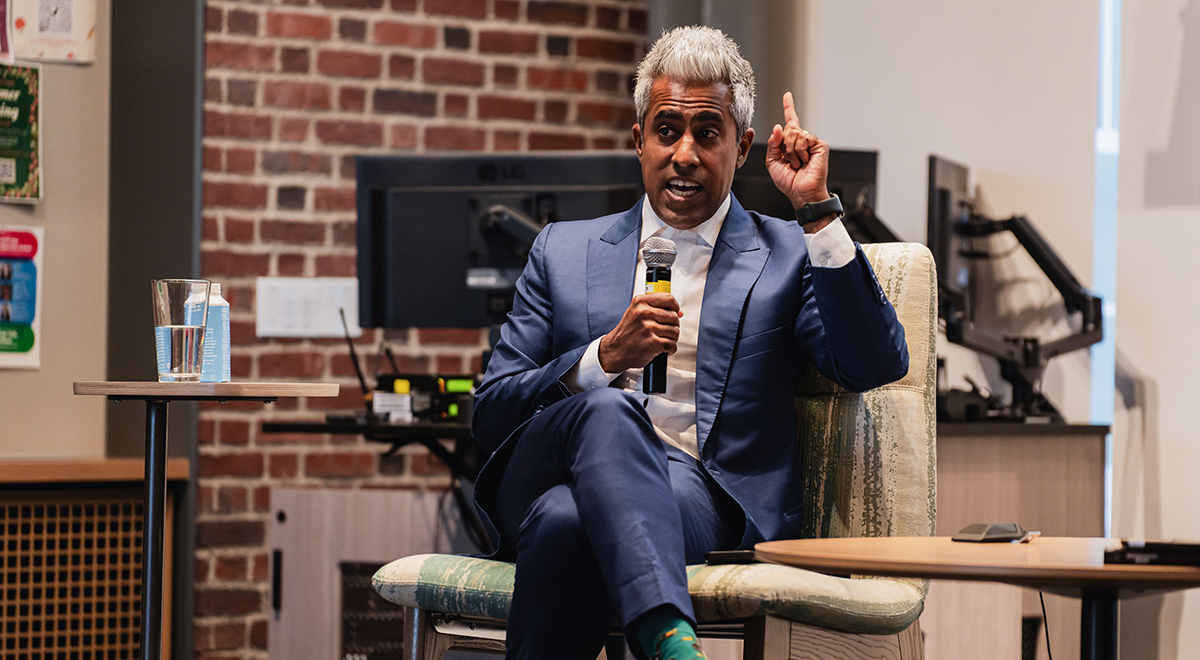How Did We Get Here? Wesleyan Puts Democracy in Action

Wesleyan students, faculty, alumni, and members of the broader university community came together with education, political, and media thought leaders Feb. 16 to 17 for critical discussions about the roles universities and students can play in defending a democracy, especially a vulnerable one.
The goal of the two-day, on-campus convening, Democracy in Action—part of the Shasha Seminar for Human Concerns—was to inspire people, especially Wesleyan students, to get involved and do the work necessary to save what many believe is the nation’s faltering democracy. From lingering false claims of widespread voter fraud to book bans and voter suppression laws, the Jan. 6, 2021 insurrection, and Russian disinformation influencing partisan political fights, American democracy is under attack.
Democracy in Action, said Wesleyan President Michael S. Roth ’78, was about the importance of participating in the public square, organizing, and voting. It was also, he said, about “the importance of fixing a system that almost everybody knows isn’t working for most people. What we’re trying to do is to remind people that the system won’t repair itself if good people don’t engage with it, in it.”
The convening opened Feb. 16 with a media literacy workshop during which Wesleyan students and others learned how to check facts, determine the credibility of source material, and to be critical consumers of political news. Students also attended a civic action fair, where they had opportunities to learn about and become involved in a range of initiatives, from environmental activism to community outreach.

That evening, Michael Eric Dyson, Distinguished University Professor of African American and Diaspora Studies, Distinguished University Professor of Ethics and Society, and NEH Centennial Chair at Vanderbilt University, delivered a spirited keynote, filled with historical context, often punctuated with humor. Throughout his address, Dyson raised—and answered—one question: how did we get here?
“When we think about democracy and where we are, we know we’re in tough shape here in America. … We know that the rise of Donald Trump in particular though, not exclusively, indicates something deeper in the nation,” Dyson said. “To blame him is to scapegoat one figure, … as opposed to turning the light on our own dark corners and figuring out how we got to where we are.”
Dyson noted that the nation made a radical shift from democracy in 2016 with the election of former President Trump.
“As bad as that is, the deep roots of anti-democracy in our nation is what we have to confront,” Dyson said. “How we got where we are, are unresolved tensions at the heart of the American project.”
With the oratorical flair of a Black Baptist preacher and astute political observations, Dyson analyzed the country’s status partially through the lens of the African American experience. The U.S., he said, has a sort of amnesia about its origins and what it has done to Black people. That is why, Dyson suggested, some people want to oppress the teaching of history.
“The attempt to ban books is to erase history. When governors are involved in determining what is the agenda of schools, we’re in trouble,” he said. “Why is it that we want to erase W.E.B. Du Bois or even Martin Luther King? Books about these figures are seen to be unacceptable. How we got where we are is that we have lived in what Mr. [Gore] Vidal called this United States of Amnesia, where we have fretfully forgotten the things that are uncomfortable to us.”
Dyson implored convening attendees not to give up, to instead keep participating in American democracy, despite how bleak the situation seems. Historical figures like Martin Luther King, Jr., and Malcom X never gave up, he said. And Malcom X understood that we have to make the country we want.
“So if you don’t get what you want to get by voting once, keep voting, keep advocating, keep talking, keep insisting that this nation live up to the true meaning of its creed as, Dr. King said, so that in the end, all of us will be able to celebrate that great motto that we adhere to: in one way or another, e pluribus unum,” he said.

A Deep Crisis
Panelists picked up the mantel on Feb. 17 with discussions on specific aspects of democracy. There was a panel on civic education, another on activism through art and one on the role of media in a democracy. And then, Anand Giridharadas, a regular political analyst for MSNBC, a journalist and internationally bestselling author, joined Roth for a closing conversation that touched on topics ranging from what democracy is to the effect of inequality on society and how Russian internet trolls effectively used social media to stoke contempt among Americans.
Giridharadas jokingly explained why he was pleased to come to Wesleyan for the convening: “It’s great to have conferences on democracy while we still have one,” he said, eliciting laughter from the crowd. “Really as many as we can pack in in the next few months.”
His comment was a reminder that democracy is neither guaranteed nor automatic.
“It was thought to be easier that one guy decided things. And then the last 300 years we tried this really different thing … which is that we should all actually … just be in a 24/7, 365 argument with each other … about every issue trivial, technical, moral. Then the result of our collective, non-stop haggling should be how the future is chosen,” Giridharadas said. “This is the most insane idea and the most successful in history, the idea that this produces better societies, better decisions, in general, is astonishing. But that whole thing is premised on the idea that you and I are talking and maybe you coming around to a position on gay rights that you didn’t have before or maybe me coming around to a view of how taxes worked that I didn’t hold before.”

Through a series of questions Roth posed, Giridharadas laid out what makes democracies work and diagnosed the challenges we are facing in the United States. Widespread civic pessimism could strike a deadly blow to democracy in the United States: “If we give up on the idea of persuasion, those people who don’t want vaccines will never want vaccines … That kind of civic fatalism is essentially the end of American democracy.”
When Roth asked what pressure inequality puts on our society, Giridharadas explained it makes people enemies.
“In a general context, when it feels like there is not enough, people turn on each other. And so, after 2016 there were all these very facile [explanations about the election], ‘It’s the economic anxiety.’ ‘No, it’s the racism’ back and forth and a lot of it was just punditry hot takes,” he said. “But very clearly it is the interaction between certain things that have happened economically and certain things that are happening in the identity sphere.”
Giridharadas also said that when social progress for previously marginalized groups meets a widespread feeling that there are not enough resources for everyone, then everyone wants those resources.
“I think the American fascist moment and movement that we’re witnessing is actually a product of the intersection of a very bad anti-democratic trajectory and a very good pro-democratic trajectory, which is to say it is the intersection of economically, a bad tendency towards greater consolidation by billionaires and less opportunity for most people,” he said.
During this time of political discord, when people are battling urges to self-censor out of fear and there are fights about speech, Giridharadas said everyone should take their cues about the path forward from the younger generation. They get it.
“I always think you got to listen to the kids. The kids are always telling you something in every era that you may not understand or that may not even be intelligible the way they’re saying it. But it always turns out to be broadly correct,” he said. “You just go back to every major struggle over rights and inclusion. It’s rare that you’re just like, ‘The kids in the ’60s wanted that group included but that didn’t turn out to be good or what we did.’ It always turns out to be good and what we did. And then, one day, very conservative people are tweeting about MLK. … I generally think when young people are trying to push a kind of new way of looking, a new way of thinking or new standards, there is usually truth there and I kind of presume truth while it’s being worked out.”

